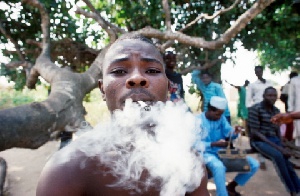Low-level drug offences should be decriminalised in West Africa, according to a high-level report.
The West Africa Commission on Drugs says drug cartels are undermining the region by using it to transit cocaine.
The commission, headed by former Nigerian President Olusegun Obasanjo, says the cartels should be tackled but that punishing the personal use of drugs does not work.
It argues that current policies incite corruption and provoke violence.
Drug trafficking and consumption have become major issues in West Africa since the turn of the century.
Efforts around this time to stem the flow of cocaine from the producing countries of Latin America to consumers in the US and Europe led criminals to target West Africa as a new route.
Dramatic events like the crash landing of a Boeing 727 full of cocaine in Mali in 2009 have alerted the authorities to the problem.
The new report, commissioned by former UN Secretary-General Kofi Annan, estimates that the annual trade in cocaine alone through West Africa is now worth $1.25bn (£744m) - more than the total of foreign direct investment in the region.

Although drug trafficking and consumption are not new to the region - cannabis smoking there, for example, has traditionally been more widespread than in most parts of the world - the advent of harder drugs like cocaine and amphetamines is.
Pre-trial detention delays Most West African countries have tough laws criminalising all aspects of drug use.
In some cases, prison sentences of 10 to 15 years are given for possession of drugs for personal use.
But in countries where court proceedings are slow, the commission's report says, people end up spending long periods in pre-trial detention and are sometimes only released after paying a bribe.
This, the report says, encourages corruption and does the prisoners more harm than good.
In Guinea, drug offences can be punished by a fine or imprisonment.
This means that the better-off drug traffickers escape by paying up - often corrupting officials in the process - while more vulnerable drug users who cannot afford fines face appalling conditions in jail.
Mr Obasanjo and his colleagues argue that drug use should be regarded primarily as a public health issue.
"Drug users need help, not punishment," the report says.
"We abhor the traffickers and their accomplices, who must face the full force of the law.
"But the law should not be applied disproportionately to the poor, the uneducated and the vulnerable, while the powerful and the well-connected slip through the enforcement net."
One of the consequences of the widespread criminalisation of drug use is a bloated prison population, with inmates who are rarely reformed and in many cases end up more criminalised or sick as a result of their time incarcerated.
The report says its recommendations on decriminalisation were partly inspired by the work of the Organisation of American States which last year floated the idea of reducing sentences, particularly for use of cannabis.
In the last decade countries as diverse as Armenia, Mexico and Switzerland have adopted some form of decriminalisation, the commission points out.
"West Africa would remove a huge weight from an already overburdened criminal justice system if it were to decriminalise drug use and possession, expand health and social services for those with problematic use, and expend greater efforts on pursuing traffickers," the report concludes.
As well as Mr Obasanjo, contributors include Senegalese psychiatrist, Idrissa Ba, retired Sierra Leonean judge Justice Bankole-Thompson and Malian singer Oumou Sangare.
General News of Thursday, 12 June 2014
Source: BBC













